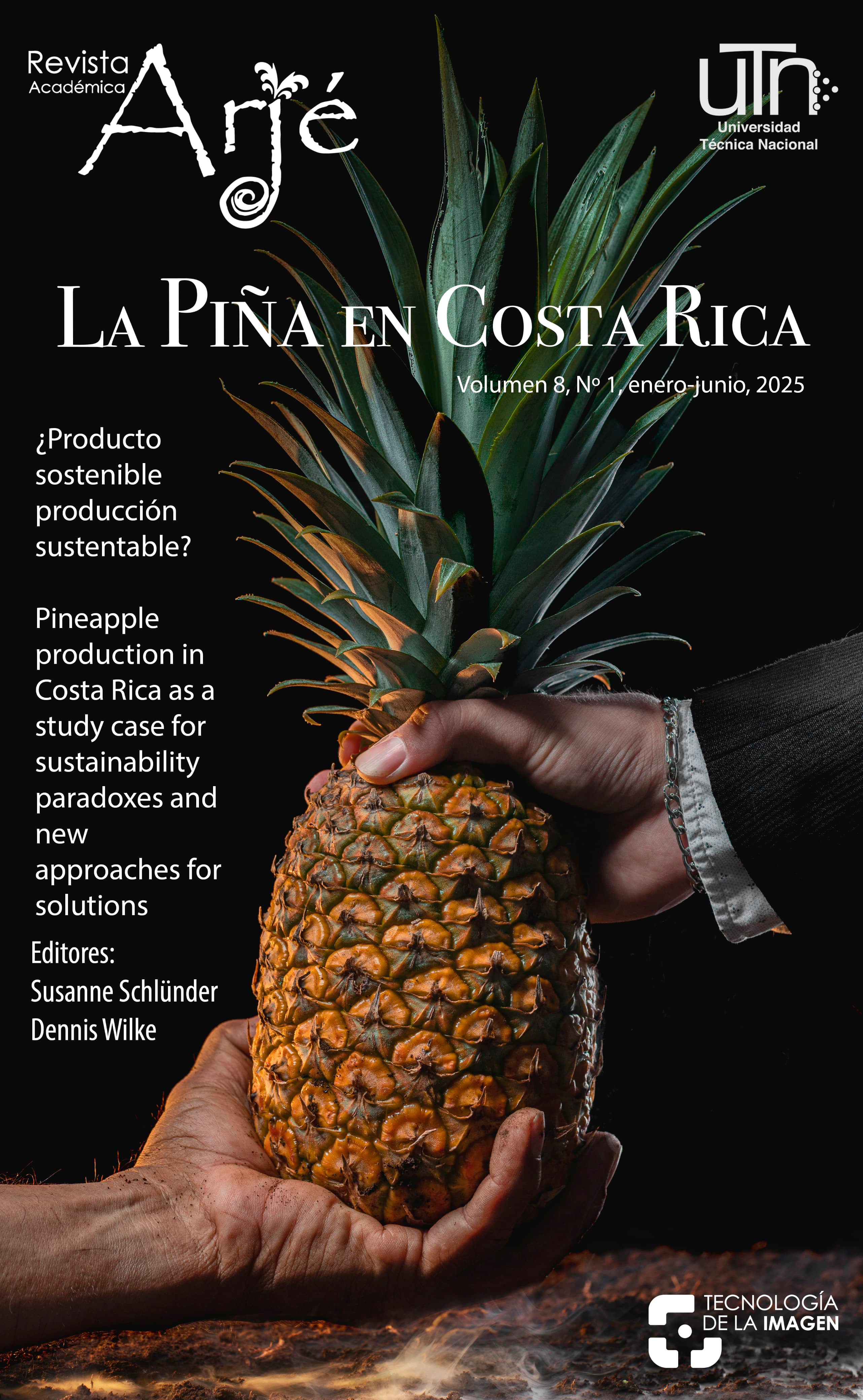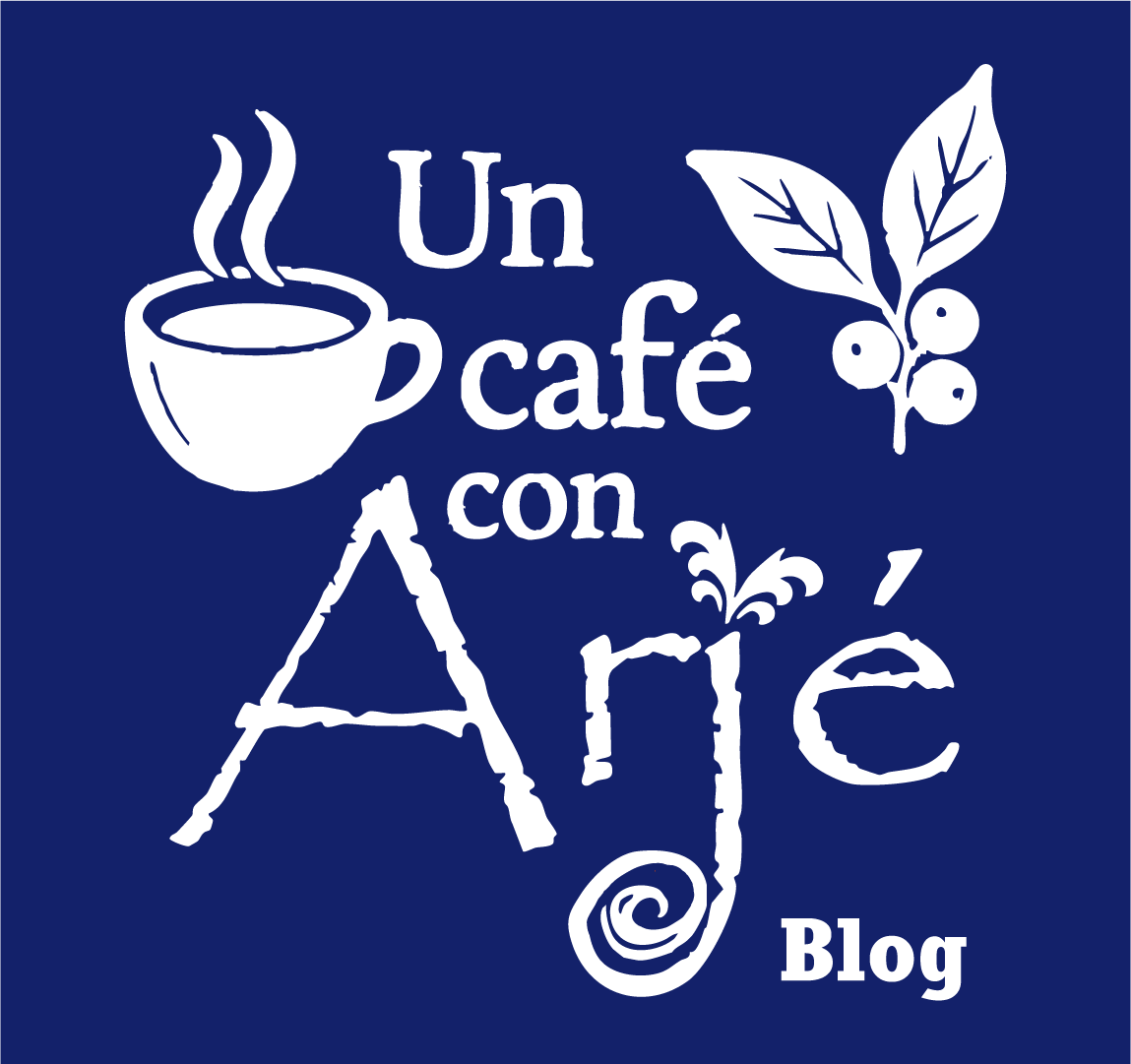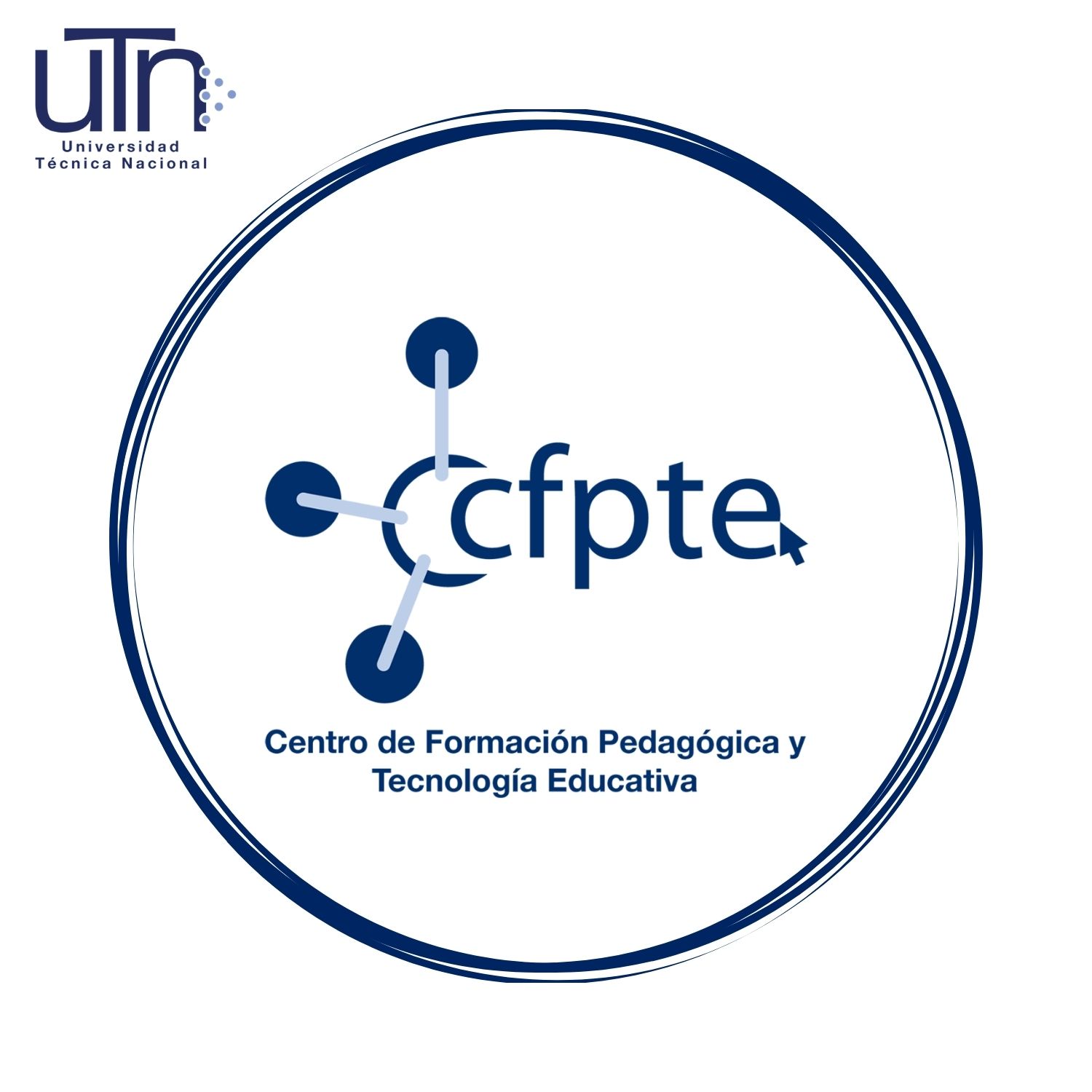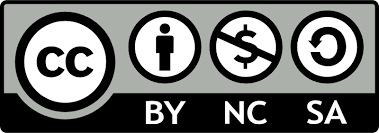Nuevos enfoques para gobernar las cadenas de suministro de piña desde Costa Rica: ¿Hacia una producción y un comercio más justos y sostenibles?
DOI:
https://doi.org/10.47633/0qw7d463Palabras clave:
Gobernanza, Medio ambiente, Derechos humanos, Política comercial, ResponsabilidadResumen
El sector piñero de Costa Rica ha sido uno de los sectores económicos clave en este país rico en biodiversidad y se ha expandido fuertemente en las últimas décadas. Es un sector orientado a la exportación y de alto impacto que ha contribuido a problemáticas de sostenibilidad como la contaminación por pesticidas, violaciones a los derechos laborales, pérdida de biodiversidad y desplazamiento de comunidades locales de sus tierras. Este artículo analiza enfoques nuevos e innovadores para mejorar la gobernanza de la cadena de suministro de este producto agrícola, enfocándose en: 1) las dinámicas actuales de certificación de sostenibilidad de la piña, 2) las nuevas leyes europeas de debida diligencia en derechos humanos y medio ambiente (HREDD, por sus siglas en inglés) para hacer responsables a las empresas por impactos negativos en sus cadenas de suministro, y 3) enfoques innovadores de bioeconomía circular solidaria que buscan utilizar los residuos de la producción de piña y agregar valor a la producción de materia prima en los lugares de origen. Con base en datos primarios que incluyen entrevistas y visitas de campo en Costa Rica, el análisis destaca las perspectivas de diferentes actores involucrados en esta cadena y los diversos instrumentos de gobernanza. Se discuten el potencial y las limitaciones de estos enfoques, preguntándose quién se beneficia y quién se ve perjudicado por los arreglos de gobernanza existentes, y mostrando cómo los instrumentos de gobernanza y la combinación de políticas podrían mejorarse aún más para contribuir a una transformación sostenible y justa de los sistemas actuales de producción y comercio.
Descargas
Referencias
Act relating to enterprises’ transparency and work on fundamental human rights and decent working conditions. (2021). https://www.regjeringen.no/contentassets/c33c3faf340441faa7388331a735f9d9/transparency-act-english-translation.pdf
Aili Hamzah, A. F., Hamzah, M. H., Che Man, H., Jamali, N. S., Siajam, S. I., & Ismail, M. H. (2021). Recent Updates on the Conversion of Pineapple Waste (Ananas comosus) to Value-Added Products, Future Perspectives and Challenges. Agronomy, 11(11), 2221. https://doi.org/10.3390/agronomy11112221
Amores-Monge, V., Goyanes, S., Ribba, L., Lopretti, M., Sandoval-Barrantes, M., Camacho, M., Corrales-Ureña, Y., & Vega-Baudrit, J. R. (2022). Pineapple Agro-Industrial Biomass to Produce Biomedical Applications in a Circular Economy Context in Costa Rica. Polymers, 14(22), 4864. https://doi.org/10.3390/polym14224864
Bastos Lima, M. G., & Schilling-Vacaflor, A. (2024). Supply chain divergence challenges a ‘Brussels effect’ from Europe’s human rights and environmental due diligence laws. Global Policy, 15(2), 260–275. https://doi.org/10.1111/1758-5899.13326
Bebbington, A., Abdulai, A.-G., Humphreys Bebbington, D., Hinfelaar, M., & Sanborn, C. (Eds.). (2018). Governing extractive industries: Politics, histories, ideas. Oxford University Press. https://doi.org/10.1093/oso/9780198820932.002.0003
Blomsma, F., Tennant, M., & Ozaki, R. (2023). Making sense of circular economy: Understanding the progression from idea to action. Business Strategy and Environment, 32(3), 1059–1084. https://doi.org/10.1002/bse.3107
Brown, J., Flint, T., & LaMay, J. (2020). The Politics of Pineapple: Examining the Inequitable Impacts of Southern Costa Rica’s Pineapple Industry. Journal of Public and International Affairs. https://jpia.princeton.edu/news/politics-pineapple-examining-inequitable-impacts-southern-costa-ricas-pineapple-industry
De Marchi, V., & Alford, M. (2022). State policies and upgrading in global value chains: A systematic literature review. Journal of International Business Policy, 5(1), 88–111. https://doi.org/10.1057/s42214-021-00107-8
Dietz, T., & Grabs, J. (2022). Additionality and Implementation Gaps in Voluntary Sustainability Standards. New Political Economy, 27(2), 203–224. https://doi.org/10.1080/13563467.2021.1881473
Directive (EU) 2024/1760 of the European Parliament and of the Council. (2024). http://data.europa.eu/eli/dir/2024/1760/oj
European Center for Constitutional and Human Rights. (2023). Edeka und Rewe verstoßen gegen Lieferkettengesetz. Q&A zum rechtlichen Hintergrund. ECCHR. https://web.archive.org/web/20241112233350/https://www.ecchr.eu/fileadmin/user_upload/Q_A_WI354b_Edeka_Bananen.pdf
Gansemans, A. (2019). Beyond the low-hanging fruit: Worker empowerment in Costa Rica-EU pineapple trade [Dissertation, Ghent University]. http://hdl.handle.net/1854/LU-8616539
Gereffi, G., Humphrey, J., Kaplinsky, R., & Sturgeon, T. J. (2001). Introduction: Globalisation, Value Chains and Development. IDS Bulletin, 32(3), 1–8. https://doi.org/10.1111/j.1759-5436.2001.mp32003001.x
Gesetz über die unternehmerischen Sorgfaltspflichten in Lieferketten. (2021). https://www.bgbl.de/xaver/bgbl/start.xav?startbk=Bundesanzeiger_BGBl&jumpTo=bgbl121s2959.pdf#/text/bgbl121s2959.pdf?_ts=1744859423104
Global Nature Fund, & Lake Constance Foundation. (2019). Del Campo al Plato: Baseline report: Biodiversity in standards of the banana and pineapple sector. https://bvearmb.do/handle/123456789/5934
Grabs, J., & Carodenuto, S. L. (2021). Traders as sustainability governance actors in global food supply chains: A research agenda. Business Strategy and the Environment, 30(2), 1314–1332. https://doi.org/10.1002/bse.2686
Green Commodities Programme. (n.d.). Country Factsheet. Costa Rica Pineapples. https://www.undp.org/sites/g/files/zskgke326/files/migration/gcp/COSTA-RICA-PINEAPPLES.pdf
Gustafsson, M.-T., Schilling-Vacaflor, A., & Lenschow, A. (2023). The politics of supply chain regulations: Towards foreign corporate accountability in the area of human rights and the environment? Regulation & Governance, 17(4), 853–869. https://doi.org/10.1111/rego.12526
Hickel, J., Hanbury Lemos, M., & Barbour, F. (2024). Unequal exchange of labour in the world economy. Nature Communications, 15(1), 6298. https://doi.org/10.1038/s41467-024-49687-y
Humbert, F., & Braßel, F. (2016). Süße Früchte, bittere Wahrheit. Die Mitverantwortung deutscher Supermärkte für menschenunwürdige Zustände in der Ananas- und Bananenproduktion in Costa Rica und Ecuador. Oxfam Deutschland. http://web.archive.org/web/20250404192810/https://www.oxfam.de/system/files/20150530-oxfam-suesse-fruechte-bittere-wahrheit.pdf
Ingwersen, W. W. (2012). Life cycle assessment of fresh pineapple from Costa Rica. Journal of Cleaner Production, 35, 152–163. https://doi.org/10.1016/j.jclepro.2012.05.035
Kruse, J. (with Schmieder, C.). (2015). Qualitative Interviewforschung: Ein integrativer Ansatz (2nd ed.). Beltz Juventa.
Loi n° 2017-399 du 27 mars 2017 relative au devoir de vigilance des sociétés mères et des entreprises donneuses d'ordre. (2017, March 27). https://www.legifrance.gouv.fr/jorf/id/JORFTEXT000034290626/
LeBaron, G., Lister, J., & Dauvergne, P. (2017). Governing Global Supply Chain Sustainability through the Ethical Audit Regime. Globalizations, 14(6), 958–975. https://doi.org/10.1080/14747731.2017.1304008
León Araya, A. (2021). Agrarian extractivism and sustainable development: The politics of pineapple expansion in Costa Rica. In B. M. McKay, A. Alonso-Fradejas, & A. Ezquerro-Cañete (Eds.), Agrarian Extractivism in Latin America (pp. 99–116). Routledge.
Marx, A., Sharma, A., & Bécault, E. (2016). Voluntary Sustainability Standards: An Overview (Acropolis Report - KLIMOS). Leuven Centre for Global Governance Studies.
Meybeck, A., & Redfern, S. (2014). Voluntary Standards for Sustainable Food Systems: Challenges and Opportunities: A Workshop of the FAO/UNEP Programme on Sustainable Food Systems (Nos. 11-12 June 2013; FAO Headquarters). Food and Agriculture Organization of the United Nations Environment Programme.
Narh Mensah, D. L., Addo, P., Dzomeku, M., & Obodai, M. (2018). Bioprospecting of powdered pineapple rind as an organic supplement of composted sawdust for Pleurotus ostreatus mushroom cultivation. Food Science & Nutrition, 6(2), 280–286. https://doi.org/10.1002/fsn3.551
Paniagua-Molina, J., & Solís-Rivera, L. R. (2020). Effect of “Golden Pineapple Innovation” on Costa Rica´s Pineapple Exports to U.S. Market: An Econometric Approach. International Journal of Food and Agricultural Economics, 8(3), 219–231.
Ponte, S. (2019). Chapter 13. Sustainability, global value chains and green capital accumulation. In S. Ponte, G. Gereffi, & G. Raj-Reichert (Eds.), Handbook on Global Value Chains (pp. 228–238). Edward Elgar Publishing. https://china.elgaronline.com/display/edcoll/9781788113762/9781788113762.00020.xml
Ponte, S. (2021). Three Orchestrating environmental sustainability in a world of global value chains. In F. Palpacuer & A. Smith (Eds.), Rethinking Value Chains (pp. 56–79). Policy Press. https://www.degruyterbrill.com/document/doi/10.56687/9781447359180-007/html
Pufé, I. (2017). Nachhaltigkeit (3rd ed.). UVK Verlagsgesellschaft.
Ramm, G., Fleischer, C., Künkel, P., & Fricke, V. (2008). Introduction of Voluntary Social and Ecological Standards in Developing Countries (No. Evaluation Reports, 043). Federal Ministry for Economic Cooperation and Development.
Regulation (EU) 2023/1115 of the European Parliament and of the Council. (2023). http://data.europa.eu/eli/reg/2023/1115/oj
Russo Lopes, G. (2023). Forest-making in agrarian frontiers: Place-based transformative pathways toward sustainability in the Brazilian Amazon [PhD thesis, University of Amsterdam]. https://hdl.handle.net/11245.1/699a1500-4330-4777-b83a-25ea86f721aa
Salvador, R., Blanco Pereira, R., Fernandes Sales, G., Vergani de Oliveira, V. C., Halog, A., & De Francisco, A. C. (2022). Current Panorama, Practice Gaps, and Recommendations to Accelerate the Transition to a Circular Bioeconomy in Latin America and the Caribbean. Circular Economy and Sustainability, 2(1), 281–312. https://doi.org/10.1007/s43615-021-00131-z
Schäkel, L. (2022). Identifizierung von Problemen im Ananasanbau Costa Ricas und Lösungsansätze für Verbesserungen entlang der Produktionskette [Doctoral thesis, Georg-August-Universität Göttingen]. https://doi.org/10.53846/goediss-9467
Tallontire, A., Opondo, M., Nelson, V., & Martin, A. (2011). Beyond the vertical? Using value chains and governance as a framework to analyse private standards initiatives in agri-food chains. Agriculture and Human Values, 28(3), 427–441. https://doi.org/10.1007/s10460-009-9237-2
Tan, E. C. D., & Lamers, P. (2021). Circular Bioeconomy Concepts—A Perspective. Frontiers in Sustainability, 2, 701509. https://doi.org/10.3389/frsus.2021.701509
Vagneron, I., Faure, G., & Loeillet, D. (2009). Is there a pilot in the chain? Identifying the key drivers of change in the fresh pineapple sector. Food Policy, 34(5), 437–446. https://doi.org/10.1016/j.foodpol.2009.05.001
Velasco-Muñoz, J. F., Mendoza, J. M. F., Aznar-Sánchez, J. A., & Gallego-Schmid, A. (2021). Circular economy implementation in the agricultural sector: Definition, strategies and indicators. Resources, Conservation and Recycling, 170, 105618. https://doi.org/10.1016/j.resconrec.2021.105618
Zahn, T., Vogel, S., Rötzsch, F., & Knapp, J. (2022, February 18). Grenzenlose Ausbeutung: Arbeitsmigrant*innen in den Lieferketten deutscher Supermärkte. Oxfam. https://www.oxfam.de/ueber-uns/publikationen/grenzenlose-ausbeutung-arbeitsmigrantinnen-lieferketten-deutscher
Descargas
Publicado
Número
Sección
Licencia
Derechos de autor 2025 Michel Ortland, Almut Schilling-Vacaflor

Esta obra está bajo una licencia internacional Creative Commons Atribución-NoComercial-CompartirIgual 4.0.
Todos los artículos de la Revista Académica Arjé se publican bajo la licencia Creative Commons Atribución-NoComercial-CompartirIgual 4.0 Internacional (CC BY-NC-SA 4.0).
Esto implica que:
- Reconocimiento: se debe otorgar crédito a los autores originales, incluir un enlace a la licencia e indicar si se han realizado cambios.
- No Comercial: no se permite utilizar el material con fines comerciales.
- Compartir Igual: si se transforma o remezcla la obra, la versión derivada debe distribuirse bajo la misma licencia.
Más información en: https://creativecommons.org/licenses/by-nc-sa/4.0/deed.es








